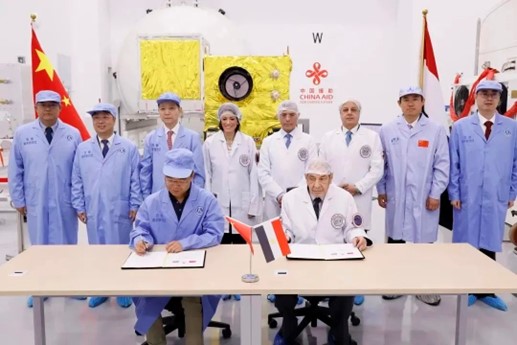China is increasing space cooperation with foreign countries.

20.10.2023
Liu Yao
In recent years, China has deepened cooperation with foreign partners in space exploration, making contributions to the peaceful exploration of outer space and promoting the progress of human civilization.
BeiDou satellites operate continuously in space. Since the official launch of the BeiDou navigation satellite system more than three years ago, its application models have become increasingly diversified and its application areas have continued to expand. According to statistics, the BeiDou-3 satellite system has currently served more than 1.5 billion users from more than 230 countries and regions, providing accelerated positioning services and other high-precision services. The system is increasingly recognized by the international community.
In the city of Xai Xai, Gaza Province of Mozambique, there is the largest cooperative rice farming project in Africa, covering an area of 20 thousand hectares. For local farmers, cultivating, sowing, caring for and harvesting crops from such huge rice fields poses a challenge.
Innovative agricultural technologies based on the Beidou satellite navigation system have brought great benefits to local farmers. Now, to control the sprayer drone, just open the mobile application. Using the location data provided by the BeiDou system, the drone can spray pesticides along a predetermined route. Unlike conventional manual sprayers, with the help of which 3-4 mu /1mu≈0.067 ha/ fields are processed per hour, an unmanned flying sprayer is capable of processing more than a hundred mu in an hour. The device can work even at night, significantly increasing spraying efficiency.
Located in eastern Tajikistan, Lake Sarez, the highest dammed lake in the world, is home to the world’s highest volumetric natural dam. Due to its location in a seismically active area, monitoring the dam’s deformations to ensure the safety of local residents has become a pressing issue.
A Chinese research team has developed a dam deformation monitoring platform with millimeter-level accuracy using the Beidou system. Scientists can remotely monitor dam deformations in real time and make scientific predictions. The system is currently used to monitor highway shoulders in Kyrgyzstan and snow slopes for avalanche prevention in Tajikistan.
“The BeiDou navigation system is actively used in various industries. It plays an important role in the operation of the China-Kyrgyzstan-Uzbekistan highway, the transportation of oil through the China-Kazakhstan oil pipeline, the regular operation of freight trains on China-Europe routes and other areas,” said Chen Guchang, deputy director of the China Satellite Navigation System Administration Office.
In June this year, the Satellite Assembly and Testing Center at Egypt’s Aerospace City hosted a handover ceremony for two prototypes of the MisrSat-2 satellite, developed with Chinese support. This allowed Egypt to become the first African country with the capabilities for final assembly, integration and testing of satellites.
In December 2014, China and Egypt signed a cooperation agreement, defining joint work in the field of remote sensing and satellite technologies. The Chinese side took upon itself the construction of Egypt’s first satellite assembly and testing center. In January 2019, the two countries signed an agreement to develop the MisrSat-2 satellite, which included the creation of a small remote sensing satellite, a ground tracking and control station and a ground application system, as well as training of technicians for Egypt .
Previously, Egypt did not have its own satellite assembly, integration and testing center, the country lacked basic satellite development capabilities, and therefore had to import foreign spacecraft. The construction of a satellite assembly, integration and testing center allowed Egypt to acquire its own international-level space infrastructure.
“These advanced technologies and equipment are extremely important not only for Egypt, but for all of Africa,” the minister said Egypt by international cooperation Rania al-Mashat.
China, together with many countries and regions of the world, is building space infrastructure, including the development and launch of communications and remote-sensing satellites, as well as the establishment of ground stations for receiving satellite signals. This has a positive effect on the development of communications, agriculture, culture, environmental protection, meteorology and other areas.
The China National Space Administration said China always strives to promote global scientific and technological progress and the sharing of innovative achievements, as well as enhancing the ability of people around the world to explore and use outer space.
China, invariably sticking to principles peaceful use space, equality, mutual benefit and common development, strives to develop the Chinese space station into an open platform for scientific and technological cooperation and exchanges targeting the entire international community.
According to official representative and deputy head of the Office of China’s Manned Space Program Lin Siqiang, experiments will soon take place on board the space station as part of the first international projects selected by China together with the UN Office for Outer Space Affairs. Moreover, 10 joint space application projects implemented by China and the European Space Agency are systematically advancing.
China recently invited countries and international organizations to participate in the Chang’e-8 lunar exploration mission to promote cooperation at both the mission level and the system and individual instrument levels. This step will facilitate new, major and original scientific discoveries in space.
Source: “People’s Daily” online http://www.people.com.cn/
